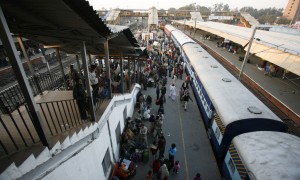The 6.7-magnitude quake hit Kaohsiung city at a depth of 15 km at 3:57 a.m. last Saturday, according to the China Earthquake Networks Center. Local monitoring authority put the scale at 6.4-magnitude.
The city of Tainan bore the brunt of the quake, especially a 16-storey apartment building built in 1992 in the Yongkang district.
The U-shaped Weiguan Jinlong building fell down toward a road on its east seconds after the quake, accounting for 114 deaths, among 289 taken out of the building by rescuers, according to an official update on the casualties.
At the time, the Weiguan Jinlong was crammed with more than 380 people, including many relatives of residents.
Many families rent apartments there as the building was next to a popular primary school. Among the deceased, more than 30 were under 16 years old.
Rescuers started searching efforts soon after the quake. In the first three days, known as the "golden 72 hours" for saving lives after a disaster, they prioritized the search for any signs of life.
On Monday, the last four survivors were rescued from the debris, including 45-year-old Tsao Wei-ling, who was trapped in the seventh floor with her husband and their 2-year-old son.
After being trapped for 52 hours, Tsao was saved and rushed to the hospital. Unfortunately, neither her husband nor her son had survived.
"When the quake came, I sat up to hug my son, and my husband immediately rushed over to hug us," she told rescuers.
After emergency treatment, Tsao is now recovering from serious dehydration and rhabdomyolysis.
A middle-aged man, a 8-year-old girl and her aunt were also saved on Monday. Family members of the missing had wished for more miracles but were disappointed.
At 3:57 p.m. Saturday, the body of the last missing resident was found in the ruins, putting an end to continuous search of lives for seven and a half days.
Lin Ming-hui, developer of the Weiguan Jinlong building, was arrested on suspicion of negligent homicide, along with two other men from his management team.
At the scene of the collapsed building, many rectangular commercial cans can be seen inside the walls exposed by the quake, apparently having been used as building material. Polystyrene was also found to be mixed in with concrete.
After the quake, local authorities started to evaluate damaged buildings reported by residents in Tainan. By 4 p.m. Saturday, more than 120 buildings were evaluated as not suitable for people to live in. Some of them must be dismantled, while others have to be consolidated.
The Chinese mainland has offered help. Xi Jinping, general secretary of the Communist Party of China Central Committee, on Sunday conveyed condolences to the victims in the earthquake.
Earthquakes frequently hit Taiwan. Most of them are minor, but a 7.3-magnitude quake, the strongest to hit Taiwan in about 100 years, shook the island on Sept. 21, 1999, leaving more than 2,000 people dead.







